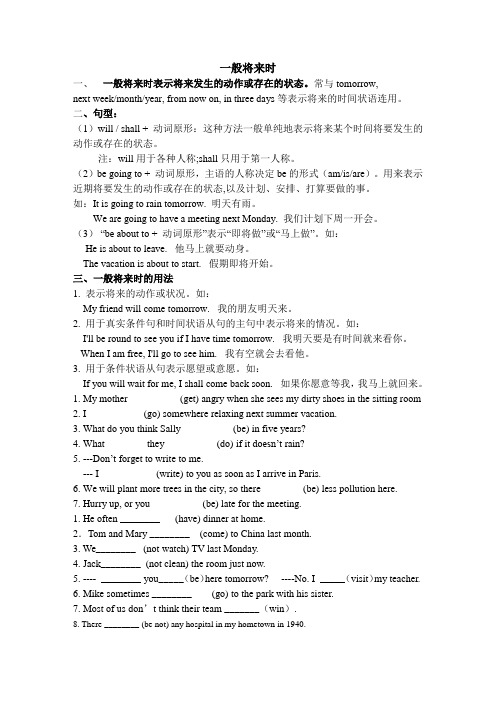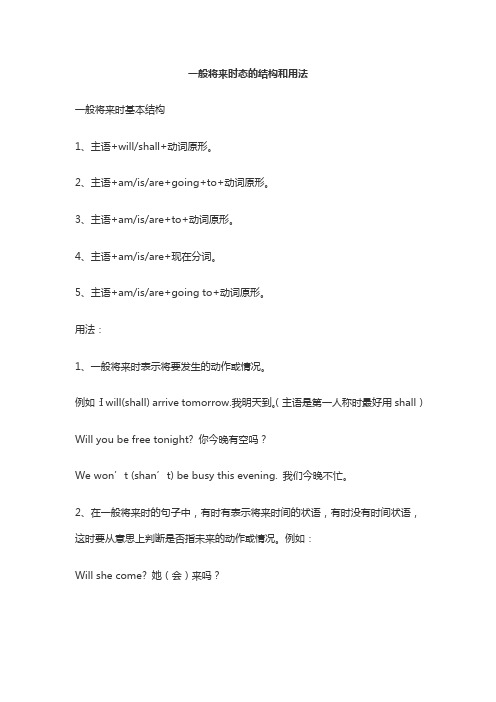一般将来时时态用法讲解
完整版一般将来时时态用法讲解

般将来时时态1. 一般将来时的定义一般将来时表示在现在看来即将要发生的动作或存在的状态。
常用时间副词tomorrow, soon 或短语n ext year / week / mon th, in a few days, in the future, sometime 做状语。
如:What will you do this afternoon ? 你今天下午干什么?We will have a meet ing tomorrow. 我们明天要开会。
He is going to study abroad (到国外) next year.明年他要出国学习。
2. 一般将来时的结构及应用(1) shall / will + 动词原形。
表示即将发生的动作或存在的状态。
特别是表示客观性的事情或在某条件下要发生的事情,只能用此结构。
如:What shall we do if he doesn '如果他不?来,我们该怎么办?Will you be free this evenin g? 今天晚上有空吗?I think he will tell us the truth (真相)。
我想他会告诉我们真实情况的。
(2) be going to +动词原形。
表示已经计划或安排好了的事情,也可表示有迹象表明肯定要发生的事情。
如:We are going to have a meeting to discuss (讨论)the matter this evening. 今天晚上开会讨论这件事情。
Look at the black clouds over there. I think it is going to rain soon. 看一看那边的乌云,我想天要下雨了。
There is going to be an En glish evening this week. 本周要举行一个英语晚会。
(3) be +现在分词。
一般将来时时态用法讲解

⼀般将来时时态⽤法讲解⼀般将来时时态1. ⼀般将来时的定义⼀般将来时表⽰在现在看来即将要发⽣的动作或存在的状态。
常⽤时间副词tomorrow, soon或短语next year / week / month, in a few days, in the future, sometime 做状语。
如:What will you do this afternoon?你今天下午⼲什么?We will have a meeting tomorrow. 我们明天要开会。
He is going to study abroad(到国外) next year. 明年他要出国学习。
2. ⼀般将来时的结构及应⽤(1) shall / will + 动词原形。
表⽰即将发⽣的动作或存在的状态。
特别是表⽰客观性的事情或在某条件下要发⽣的事情,只能⽤此结构。
如:What shall we do if he doesn’t come 如果他不来,我们该怎么办?Will you be free this evening 今天晚上有空吗?I think he will tell us the truth(真相)。
我想他会告诉我们真实情况的。
(2) be going to + 动词原形。
表⽰已经计划或安排好了的事情,也可表⽰有迹象表明肯定要发⽣的事情。
如:We are going to have a meeting to discuss (讨论)the matter this evening. 今天晚上开会讨论这件事情。
Look at the black clouds over there. I think it is going to rain soon. 看⼀看那边的乌云,我想天要下⾬了。
There is going to be an English evening this week. 本周要举⾏⼀个英语晚会。
(3) be +现在分词。
一般将来时态

一般将来时一、一般将来时表示将来发生的动作或存在的状态。
常与tomorrow,next week/month/year, from now on, in three days等表示将来的时间状语连用。
二、句型:(1)will / shall + 动词原形:这种方法一般单纯地表示将来某个时间将要发生的动作或存在的状态。
注:will用于各种人称;shall只用于第一人称。
(2)be going to + 动词原形,主语的人称决定be的形式(am/is/are)。
用来表示近期将要发生的动作或存在的状态,以及计划、安排、打算要做的事。
如:It is going to rain tomorrow. 明天有雨。
We are going to have a meeting next Monday. 我们计划下周一开会。
(3)“be about to + 动词原形”表示“即将做”或“马上做”。
如:He is about to leave. 他马上就要动身。
The vacation is about to start. 假期即将开始。
三、一般将来时的用法1. 表示将来的动作或状况。
如:My friend will come tomorrow. 我的朋友明天来。
2. 用于真实条件句和时间状语从句的主句中表示将来的情况。
如:I'll be round to see you if I have time tomorrow. 我明天要是有时间就来看你。
When I am free, I'll go to see him. 我有空就会去看他。
3. 用于条件状语从句表示愿望或意愿。
如:If you will wait for me, I shall come back soon. 如果你愿意等我,我马上就回来。
1. My mother __________(get) angry when she sees my dirty shoes in the sitting room2. I ___________(go) somewhere relaxing next summer vacation.3. What do you think Sally __________(be) in five years?4. What ________they __________(do) if it doesn’t rain?5. ---Don’t forget to write to me.--- I ___________(write) to you as soon as I arrive in Paris.6. We will plant more trees in the city, so there ________(be) less pollution here.7. Hurry up, or you __________(be) late for the meeting.1. He often ________ (have) dinner at home.2.Tom and Mary ________ (come) to China last month.3. We________ (not watch) TV last Monday.4. Jack________ (not clean) the room just now.5. ---- ________ you_____(be)here tomorrow? ----No. I _____(visit)my teacher.6. Mike sometimes ________ (go) to the park with his sister.7. Most of us don’t think their team _______(win).8. There ________ (be not) any hospital in my hometown in 1940.。
一般将来时态的结构和用法

一般将来时态的结构和用法一般将来时基本结构1、主语+will/shall+动词原形。
2、主语+am/is/are+going+to+动词原形。
3、主语+am/is/are+to+动词原形。
4、主语+am/is/are+现在分词。
5、主语+am/is/are+going to+动词原形。
用法:1、一般将来时表示将要发生的动作或情况。
例如:I will(shall) arrive tomorrow.我明天到。
(主语是第一人称时最好用shall)Will you be free tonight? 你今晚有空吗?We won’t (shan’t) be busy this evening. 我们今晚不忙。
2、在一般将来时的句子中,有时有表示将来时间的状语,有时没有时间状语,这时要从意思上判断是否指未来的动作或情况。
例如:Will she come? 她(会)来吗?3、在以第一人称I或we作主语的问句中,一般使用助动词shall,这时或是征求对方的意见,或是询问一个情况(b):a. Where shall we meet? 我们在哪儿碰头?b. Shall we have any classes tomorrow?明天我们有课吗?在这类问句中,近几年来也有不少人用will,特别是在美国。
例如:How will I get there? 我怎么去?扩展资料:一般将来时表示将来某一时段的动作或状态,或将来某一段时间内经常的动作或状态。
在英语时态中,“时“指动作发生的时间,”态“指动作的样子和状态。
一般将来时常常和表示将来的时间状语连用。
如:tomorrow(明天),next week (下周);in the future(将来);in a year(一年以后)等。
一般将来时由助动词shall(第一人称),will(所有人称)动词原形构成。
美式英语则不管什么人称,一律用will。
或用主语+be动词+ going to 动词(be going to)。
一般将来时态用法

一般将来时态用法一般将来时表示在将来某个时间要发生的动作或存在的状态。
一. 一般将来时的基本用法:表示“纯粹的将来”:①表示将要发生的动作或情况,常带有表示将来的时间状语,如tomorrow, next week, in two days, from now on 等。
如:It will be fine tomorrow. 明天天气晴朗。
②表示预料将要发生的动作或情况。
如:You will feel better after having this medicine. 吃了这药,你就会感觉好些的。
二. 一般将来时的构成:1. 由助动词“ shall/ will +动词原形”构成,shall 用于第一人称,will 用于第二、第三人称,而美式英语在陈述句中无论什么人称,一律用will. 表示“带有情态意义的将来”,用来表示意图,用will 来表示。
如:I will be more careful next time. 下次我要更加小心。
I won't go shopping this afternoon, but she will. 今天下午我不想去购物,但她想去。
2. will 在疑问句中,用来表示有礼貌地征询对方的意见。
如:Will you have some more tea 要不要再喝点茶What shall we do this weekend 本周末我们要干什么3. 一般将来时的否定和疑问形式:一般将来时的否定形式是will not ,缩写为won't; shall not ,缩写为shan't 。
一般将来时的疑问形式是把will/ shall 提到主语前。
如:He won’t go to th e park this Sunday. 本周日他不去公园。
Will you go swimming with me 和我一起去游泳好吗4. shall只用于第一人称,如用于第二、第三人称,就失去助动词的意义,已变为情态动词,试比较: He shall come. 他必须来。
英语语法 什么是一般将来时

英语语法什么是一般将来时一般将来时(Simple Future Tense)是英语语法中用来表示将来发生的动作、事件或状态的一种时态。
它在句子中起着重要的作用,可以帮助我们准确描述未来的计划、意图或预测。
在这篇文章中,我将详细探讨一般将来时的用法和构造,以及一些常见的例子。
请注意,这是一个详细的讨论,所以文章会比较长。
让我们开始吧!一、一般将来时的构造一般将来时的构造非常简单,主要由助动词"will"或"shall"加上动词的原形构成。
下面是一些例子:1. I will go to the party tomorrow.我明天会去参加派对。
2. She will study abroad next year.她明年会出国留学。
3. They will visit their grandparents this weekend.他们这个周末会去看望他们的祖父母。
4. We shall meet at the park.我们将在公园见面。
5. He will not come to the meeting.他不会来参加会议。
6. Will you help me with my homework?你会帮我做作业吗?二、表示计划和意图一般将来时常常用来表示将来的计划、意图或打算。
下面是一些例子:1. We will have a meeting tomorrow.我们明天会开会。
2. She will start a new job next month.她下个月会开始一份新工作。
3. They will travel to Europe next summer.他们明年夏天会去欧洲旅行。
4. I will buy a new car next year.我明年会买辆新车。
5. He will learn to play the piano.他会学弹钢琴。
6. We shall visit our friends in the evening.我们晚上会去拜访我们的朋友。
初二英语语法分析--一般将来时用法讲解
初二英语语法分析:一般将来时用法讲解一、一般将来时的概念一般将来时表示将来某个时间要发生的动作或存在的状态,也常常与表示将来时间的时间状语连用,如:tomorrow (明天),next week(下周),from now on(从现在开始),in the future(将来)等。
二、一般将来时的基本结构will + 动词原形这是表达一般将来时最常用的方法。
例句:I will go shopping tomorrow.(我明天要去购物。
)be going to + 动词原形这种结构通常用于表示计划或安排好的事情。
例句:She is going to visit her grandparents next week.(她下周要去看望她的祖父母。
)be to + 动词原形这种结构表示计划或安排,常用于官方文件或正式场合。
例句:You are to arrive at the airport at 8:00 am.(你早上8点要到达机场。
)be about to + 动词原形这种结构表示即将发生的动作,意为“正要做某事”。
例句:I am about to leave.(我正要离开。
)be due to + 动词原形这种结构表示某事预定或预期将要发生。
例句:The train is due to arrive at 5:00 pm.(火车预定下午5点到达。
)三、一般将来时的用法1表示将来的动作或状态例句:I will buy a new car next year.(明年我要买一辆新车。
)2表示将来的计划或安排例句:We are going to have a picnic this weekend.(我们这个周末要去野餐。
)3表示根据现有情况推测未来的可能性例句:It's going to rain soon.(很快就要下雨了。
)4表示命令、请求、建议等例句:You are to finish your homework before you go out.(你出去之前要把作业做完。
动词时态一般将来时的用法
动词时态一般将来时的用法动词时态包含了多种不同的形式,每种形式都传达了特定的时间信息。
在英语中,一般将来时是用来表达将来发生的动作、事件或状态的。
本文将详细介绍一般将来时的用法,并提供一些例句来帮助读者更好地理解。
一、一般将来时的定义一般将来时是用来表达明确的将来发生的动作或状态。
通常使用的助动词是will或shall,根据主语的不同而定。
二、一般将来时的构成1. 肯定句结构:主语 + will + 动词原形例如:- I will go shopping tomorrow.- He will travel to Europe next week.2. 否定句结构:主语 + will + not + 动词原形,或主语 + won't + 动词原形例如:- She will not visit her grandparents this weekend.- They won't attend the party.3. 疑问句结构:Will + 主语 + 动词原形?例如:- Will you join us for dinner?- Will they arrive on time?三、一般将来时的用法1. 表达自愿或意愿一般将来时常常用来表达主观上的决定、打算或愿望。
例如:- I will help you with your project.- He will volunteer at the local charity organization.2. 表示未来的计划或安排一般将来时可用于描述预定的时间表或安排。
例如:- We will have a meeting at 9am tomorrow.- They will arrive at the airport in the evening.3. 表示预测或推测有时,我们可以根据现有的证据或情况,使用一般将来时来推测未来可能发生的事情。
(完整版)高中一般将来时讲解
(完整版)高中一般将来时讲解高中一般将来时讲解(完整版)一般将来时是英语语法中的一个重要时态,用来表示将来发生的动作或状态。
在高中阶段,学生需要掌握和运用一般将来时来描述将来的计划、意图、预测等。
下面我们将详细介绍高中一般将来时的使用和构成。
使用一般将来时可以用于以下几种情况:1. 表示将来的计划或安排。
例如:I will go to the beach this weekend.(我将在这个周末去海滩。
)2. 表示将来的意图。
例如:She will study medicine in college.(她打算在大学研究医学。
)3. 表示将来的预测或推测。
例如:It will rain tomorrow.(明天会下雨。
)构成一般将来时的构成非常简单,只需将"will"(shall)加在动词的原形前即可。
例如:I will study.(我将要研究。
)He will go.(他将要去。
)注意事项在使用一般将来时时,还需要注意以下几点:2. 疑问句的构成是将"will"(shall)置于句首。
例如:Will you attend the meeting?(你会参加会议吗?)3. 一般将来时通常不能用于表示固定的时间表或时间表安排,此时应使用其他时态。
例如:The train leaves at 9 a.m.(火车在上午9点离开。
)希望以上内容能够帮助你更好地理解和运用高中一般将来时。
如果还有任何问题,请随时向我提问。
英语一般将来时的用法
英语一般将来时的用法摘要:1.英语一般将来时的概念2.英语一般将来时的构成3.英语一般将来时的用法实例正文:英语一般将来时是表示将来某个时间要发生的动作或存在的状态,通常用于表示计划、安排、意图、预测等。
一般将来时与现在时、过去时相对应,是英语时态中的三大基本时态之一。
英语一般将来时的构成有两种:1.be going to + 动词原形:表示计划、安排、意图等,强调动作的将来性。
例如:I am going to study English tomorrow.(我明天要学英语。
)2.will + 动词原形:表示将来的客观事实、预测等,强调动作的确定性。
例如:It will rain tomorrow.(明天会下雨。
)英语一般将来时的用法实例:1.表示计划、安排、意图等- I am going to travel around the world next year.(我明年要去环游世界。
)- She will learn to play the piano after graduation.(她毕业后要学弹钢琴。
)2.表示将来的客观事实、预测等- The sun will rise in the east.(太阳会从东方升起。
)- Spring will come soon.(春天即将到来。
)3.在某些条件句中,一般将来时表示将来可能发生的情况- If it rains, I will stay at home.(如果下雨,我会待在家里。
)- If he studies hard, he will pass the exam.(如果他努力学习,他会通过考试。
)通过以上分析,我们可以看出英语一般将来时在实际应用中的重要性。
- 1、下载文档前请自行甄别文档内容的完整性,平台不提供额外的编辑、内容补充、找答案等附加服务。
- 2、"仅部分预览"的文档,不可在线预览部分如存在完整性等问题,可反馈申请退款(可完整预览的文档不适用该条件!)。
- 3、如文档侵犯您的权益,请联系客服反馈,我们会尽快为您处理(人工客服工作时间:9:00-18:30)。
一般将来时时态用法讲解Last revision on 21 December 2020一般将来时时态1. 一般将来时的定义一般将来时表示在现在看来即将要发生的动作或存在的状态。
常用时间副词tomorrow, soon或短语next year / week / month, in a few days, in the future, sometime 做状语。
如:What will you do this afternoon 你今天下午干什么We will have a meeting tomorrow. 我们明天要开会。
He is going to study abroad(到国外) next year. 明年他要出国学习。
2. 一般将来时的结构及应用(1) shall / will + 动词原形。
表示即将发生的动作或存在的状态。
特别是表示客观性的事情或在某条件下要发生的事情,只能用此结构。
如:What shall we do if he doesn’t come 如果他不来,我们该怎么办Will you be free this evening 今天晚上有空吗I think he will tell us the truth(真相)。
我想他会告诉我们真实情况的。
(2) be going to + 动词原形。
表示已经计划或安排好了的事情,也可表示有迹象表明肯定要发生的事情。
如:We are going to have a meeting to discuss (讨论)the matter this evening. 今天晚上开会讨论这件事情。
Look at the black clouds over there. I think it is going to rain soon. 看一看那边的乌云,我想天要下雨了。
There is going to be an English evening this week. 本周要举行一个英语晚会。
(3) be +现在分词。
表示即将发生的动作或存在的状态。
这个句型中动词主要是瞬间动词:come, go, leave, arrive, begin, start, stop, close, open, die, join, borrow, buy等。
如:Go ahead, and I’m coming. 走前面一点吧,我就来。
The dog is dying. 那条狗要死了。
Hurry up. The shop is closing. 快点,商店就要关门了。
(4) 一般现在时。
表示一种严格按照计划进行的动作。
比方说,上课、飞机起飞、火车离站等。
如:Don’t hurry. The meeting starts at a quarter past eight. 不要匆忙,回忆八点过一刻开始。
The bus goes back at four thirty. 汽车四点返回。
巩固练习:一、用所给动词的适当形式填空Lei tells me he _________________(visit)the Great Wall(长城)this weekend.mother _________________(buy)me a pair of new trousers tomorrow.says she _________________(leave)soon._________________(go) skating if it doesn’t rain next Sunday._________________(be)an English evening next week.over, and you _________________(get)a good idea.7.——___________Jim ___________(have)a picnic next Monday——-No, he __________._________________(miss)you after you leave here._________________(teach)you English next year_________________ (be) back in three hours.at these clouds. It ___________________ (rain).二、改错:每处划线中有错误,在题后改正will sing anddancesfor us tomorrow.you going to swim ------Yes, Iwill.will help Jim with his Englishevery day.her sistersingsa song for me tomorrow’t plant trees next week.they going toplaysbasketball tomorrowgo to visit the factory tomorrowbe going tomake dumplings for Emma.the boys going to the Great Wall next month ------Yes, theywill.三、句型转换:Jimis going to play clean the windowsnext week.否定句:____________________________ ______________________________一般疑问句:_____________________________ ______________________________两回答:___________________________ _____________________________特殊疑问句:______________________ _____________________________四、选择题( )1. —Are you going to _______ our English team—Yes, I am.A. take part inB. joinC. took part inD. joined( )2. Xu Xia and her teammates are _______ the USA next week.A. leaving forB. leave forC. leaveD. left( )3. There _______ an English party in our class next week.A. is going to haveB. is going to beC. will haveD. Have( ) 4. If it _______ tomorrow, we will go to the park.A. isn’t rainB. don’t rainC. doesn’t rainD. won’t rain( )5. There ______ a football match next week. Shall we go and watch itA. will haveB. hasC. haveD. will be“Would you mind doing…”句型透视mind用作动词时,习惯后接动名词(短语)作宾语,而不接动词不定式,常用于Would you mind doing…句型中,具体用法是:1. “Would you mind doing…”句型常用于表示请求,意思是“请你做……你是否介意、请你做……好吗”,是一种比较客气的表达方式。
如:Would you mind turning off the light in the room请你把房间里的灯关掉好吗如果要表示“请你不要做……你是否介意、请你不要做……好吗”,只需要在doing前面加上not.如:Would you mind not standing in front of me请你不要站在我的前面好吗2. 如果同意,表示不介意时,可用如下用语来表达:Certainly/Of course not./Not at all./No, not at all;如果不同意,表示介意时,常用“Sorry/I‘m sorry.”(对不起)及陈述某种理由来表示拒绝或反对。
如:—Would you mind going to the movies this evening今晚去看电影好吗—I‘m sorry. But I haven’t finished my homework yet.对不起,我的作业还没有完成。
学习时还要注意:1.“Would you mind doing…”句型中的would也可用do代替,但语气较生硬,不如用would客气。
2.“Would you mind doing…”句型中的逻辑主语只能是谈话的对方you.如果想要对方允许自己做某事,可用“Would you mind my doing…”句型,如:Would you mind my smoking here你介意我在这里吸烟吗巩固练习:一、用下面提供的短语完成句子。
1. help me wash my clothesWould you mind ______________________________2. give her a cup of teaWould you mind _______________________________3. help him mend his carDo you have _______________________________4. walk on the roadWould you mind _______________________________ on the road二、选择题( )1. —Would you mind _______ us in the game—Not at all.A. joiningB. joinC. join inD. joining in( )2. —Would you like to climb mountains with me this Sunday—I’d love to. But I _______ play table tennis against Class Three.A. am goingB. am going toC. amD. going to( )3. —Would you mind _______here—I’m sorry about that. I’ll go somewhere else.A. no smokingB. not smokingC. no smokeD. not smoke1. had better 的基本用法特点其意为“最好”、“应该”,后接动词原形,与情态动词should用法相似,其中的had通常缩略为’d:You’d better get some sleep.你最好去睡一会儿。
